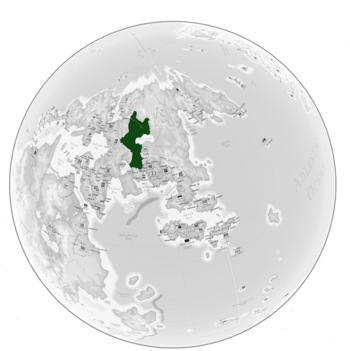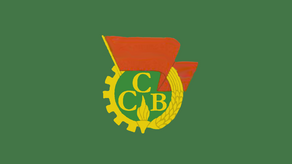Welkija
Socialist Commonwealth of Welkija Cоциалистичного Содружство Велкиыи | |
|---|---|
| Motto: United In Friendship And Labour | |
 | |
| Political Capital | Nowa Huta |
| Official languages | Miedzywielskiji, |
| Common languages | Polysan, Welk, Thulsk, Bialsk, Fyodczian, Minor Yasic Languages |
| Demonym(s) | Welk |
| Government | Socialist Commonwealth |
• Prime Minister | Mieczysław Mijal |
| Establishment | |
• The Popular Revolution | 1915 |
• Declaration Of The Socialist Commonwealth | 1916 |
| Area | |
• Total | 650,602 km2 (251,199 sq mi)Approximate |
| Population | |
• 2018 census | 14,263,654 |
• Density | 21.5/km2 (55.7/sq mi) |
| GDP (PPP) | 2024 estimate |
• Total | $25.2 Billion |
• Per capita | $14,126 |
| Gini | low |
| HDI (2024) | very high |
| Currency | Wielkijan zlaty (WMK) |
| Driving side | right |
Welkija (Велкия) also known as the Socialist Commonwealth of Welkija (Cоциалистичного Содружство Велкиыи) is a Yasic nation located in Argis, spanning from the Intrian sea all the way up to the northern tundra's. Its a sparsely populated nation of 14 million, largely located in the southern and central regions of the country with Nowa Huta, built around the nations largest steel mills functions as its political and industrial capital. With Volkovsk, the countries second largest city, functioning as its cultural capital.
Welkija emerged as a political entity in 1545 following the collapse of the Ahranian empire as the Duchy of Velaki, the subsequent years are referred to as the 'Smuta' in which the Grand Duchy invaded and politically annexed other neighboring breakaway neighbor states, officially declaring itself the kingdom of Welk in 1654. In 1670 it began its northern expansion, coming to control the west coast of the Amber sea and the northern tundra's, by 1750 it held all the territories which constitute the modern state of Welkija. The Kingdom of Welk ceased to exist in the year 1915 following the Popular Revolution in which the Commonwealth was declared. Ruled by a defacto one party state under the United Workers Party, who's rule saw to the industrialization and urbanization of much of the country, however due to political infighting many proposed reforms failed leading to extreme stagnation through the 90's and a rise of opposition groups within Welkija, by 2020 external and internal pressure forced the United Workers Party to hold its first free elections, in which it lost its majority of seats while remaining the largest party within parliament, forming a hung parliament which has failed to pass the most basic of legislation in modern years.
Despite Welkija being a multi-ethnic commonwealth spanning dozens of cultures and ethnic groups, the country speaks one unified language, Miedzywielskiji, being a artificial language constructed in 1927 with the purpose of helping unify the country due to its decentralized nature. Originally only being mandated in government use, it soon spread and began being taught at schools. The 1928 Census suggests that over 178 languages were used in the country, in modern years this figure has dropped drastically as Miedzywielskiji has become the common language across most the country due to increasing urbanization and the rise of the internet.
Grand Duchy of Velaki (1545-1654)
Following the collapse of the Ahranian empire in 1545, the duchy of Velaki, located around the city of Volkovsk got its defacto independence alongside various other constituencies. Due to the collapse of supply lines, bad harvests, and general backwardness without access to the resources of the empire, this period is commonly referred to as the 'Smuta' in Welkija. 'Smuta' cannot be translated directly however it can be defined as a period in which old authorities are no longer in power but have not been properly replaced, a period in which chaos and lack of order is commonplace. The Duchy of Velaki, through diplomatic marriage and warfare managed to unify the eastern Ahranian breakaway states by 1654, bringing a official end to the Smuta.
Kingdom of Welk (1654-1915)
Kind Vladislav 'The Welk' declared the kingdom of Welk after uniting the Yasic breakaway states. His Son Vladislav II would further expand the Kingdom eastward by establishing Rinava as a tributary towards the Kingdom via the marriage of Kazimir Czarka, brother of Vladislav II, into the royal family of Rinava, creating a Welkian cadet branch. A relationship which lasted until the revolution of 1826, which marked the beginning of the decline for the Kingdom of Welk.
Commonwealth of Welkija (1915-16)
The short lived Democratic commonwealth came to a crashing collapse following the victory of the 'United Left' (Cједињена лєвица SL) The coalitions was dominated by the Socialist Party of Welkia (Sоциалистична партија Велкия SPW) which utilized its influence to leverage its subordinate members into 'merging', with these mergers favoring the Socialist Party. The party which came about as a result of this became a amalgamation of broad left wing theories and beliefs leading to the party holding many inherently contradictory positions at once which formed the 'Party line'. The new 'United Workers Party' (Cједињена партија работница SPR)
Socialist Commonwealth Of Welkija (1916 Onwards)
First government of the 'United Workers Party'
The bill which brought about the end of the Commonwealth was the 'Act of national unity' which stipulated ever party which ran for election required to sign a agreement which required them to not campaign or oppose any bill which passed through parliament in order to maintain "Democratic Centralism". This stripped any opposition party of any agency to oppose government decisions. Only a minority of opposition parties chose to work within the system, with them usually being regarded by the public as 'controlled opposition' or 'communist collaborators'.
Subsequent Governments
Future governments suffered from high degrees of 'cliquism' with party members undermining each others positions and party initiatives. Economic planning remained largely inefficient through most this period due to government having the ability to change plans/halt projects halfway through leading to many abandoned projects through Welkija. Collectivization was attempted multiple times and after each failed attempt its interpretation of collectivization was not undone, leading to various different forms of 'collective farms' operating simultaneously, some under government jurisdiction and working according to the plan, while others operate as private co-operative enterprise owned by those that work on it. The system is confusing and unintuitive, and often times through collectivization, individual agricultural enterprise were offered differing terms from each other leading to a non-standard collectivization.
Economic Planning
The economy of Welkija is centrally planned with regular planning intervals of 6 years, the first plan being in 1920. Welkija is currently undergoing its 17th 6 year plan with limited success.
Free Elections and Democratization
Opposition to one party rule reached a peak in 2023 in which the government, as a result of foreign and internal pressure, was forced into allowing the first democratic elections. The opposition remained disunited and thus none of the parties within it managed to acquire the necessary seats to secure a majority within parliament, leading to the SPR continuing its undisturbed governance, however, lacking the seats for a majority it is unable to pass legislation through parliament without the consent of its opposition, leading to a tense situation within the legislature.
Transformation of Nature
Welkija has a long standing tradition stemming back to 1700s of attempting to bend nature into its will, having a specific word for this 'Prizelenišče' (Призеленище) literally meaning, "To make green". This desire in controlling nature is one which is within the very culture and soul of the Welks as they continuously attempted to "turn the northern tundra's green" Most of these projects, due to lack of scientific backing, have as expectedly produced little to no result, such as utilizing arrays of magnifying glasses in 1734 in order to "heat up the climate". This however have not slowed down the Welks with attempts at mega projects never ceasing.
Culture
Literature
Classic Welkijan works often depict the nations tumultuous past as well as its struggles, while modern literature tends to explore themes of identity and revolution. The Welkijan literary style has been described as a blend of "Socialist Realism" and tragedy.
Music
Traditional Welkijan music incorporates instruments such as the Balalaika, Gusli and most prominently accordion, the most popular genre of music in Welkija is "Disco-Welk" characterized by upbeat electronic sounds, simple lyrics and a "strong rural feel", often compromising much of new years party playlists as well as wedding dance music.
Festivals and holidays
Welkija possesses one of the highest number of mandatory days off in Argis commemorating events in its history, including the beginning of the revolution, the declaration of the Socialist Commonwealth, the declaration of the Kingdom, the first of may workers day parade. Many Welks also celebrate ancient festivals such as 'Kupala night' which celebrates the summer solstice, traditionally celebrated on the shortest night of the year.
Cuisine
The cuisine of Welkija largely compromises of root vegetables such as beet, potatoes and cabbage, with sour cream being a conventional topping for most foods. Welks are renowned for there love of Paprika. The Welks have a seasonal diet with little to no tropical foods imported out of season due to costs, leading to fruit such as oranges being treated as delicacies during the winter months. Despite this lack of variety, most Welks have high calory intakes due to the subsidization of food prices by the government.
Some popular dishes include:
- Borscht
- Barszcz Zurek served in bread
- Potato Pierogi
- Goulash
- Chili con-carnae
Social Values
Most Welks have a degree of communal spirit instilled within them and the desire to work alongside others, they do not wince at the prospects of sharing accommodation while at university, or communal eating spaces within housing blocs, for them its a reality of life. Welks also tend to have a strong focus on education, with government paid tuition and government provided accommodation, a large percentage of Welks are university educated, with a focus on science, technology as well as medicine, while humanities subjects are still valued, with most party members coming from humanities backgrounds.
Government and politics
In progress
Foreign Relations
In progress
Military
In progress
Economy
In progress
Geography and Biodiversity
In progress
Flag
List of the flags of Welkija



